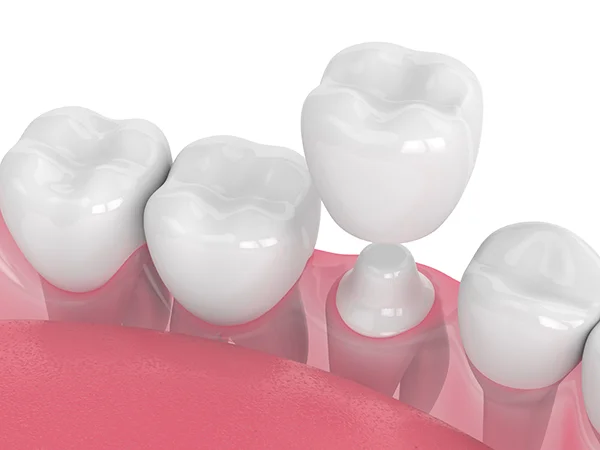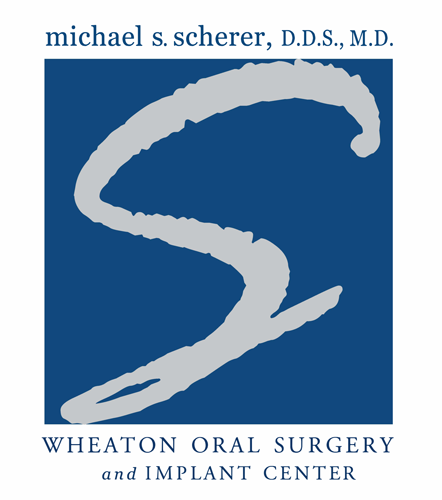Tooth Crown
Naperville, IL
Tooth Crown provided by Dr. Michael Scherer
in Naperville, IL at Wheaton Oral Surgery
 A tooth crown is a custom-made cap that covers the entire visible portion of a tooth. Crafted from various materials such as porcelain, ceramic, metal alloys, or a combination of these, dental crowns serve to restore the shape, size, strength, and appearance of a damaged or compromised tooth. A tooth crown is a custom-made cap that covers the entire visible portion of a tooth. Crafted from various materials such as porcelain, ceramic, metal alloys, or a combination of these, dental crowns serve to restore the shape, size, strength, and appearance of a damaged or compromised tooth.
The crown is designed to mimic the natural tooth, ensuring a seamless integration with the rest of the dental arch.
When Might You Need a Tooth Crown?
Several situations may warrant the need for a tooth crown. Teeth that are structurally weakened due to extensive decay, fractures, or large fillings may benefit from the added strength and protection provided by a crown procedure at Wheaton Oral Surgery.
Dental crowns can restore teeth that have sustained significant damage, whether through trauma or gradual wear and tear. They can also aesthetically enhance teeth with severe discoloration, irregular shape, or size discrepancies.
When a tooth has a large filling, the remaining natural tooth structure may become susceptible to fractures. A crown helps protect and stabilize the tooth, preventing further damage.
Tooth crowns are often used to anchor dental bridges. They are placed on the adjacent healthy teeth to support and secure the bridge, filling the gap left by missing teeth.
Types of Tooth Crowns
We have several types of dental crowns available for our patients. The types of dental crowns are porcelain crowns, ceramic crowns, metal crowns, and porcelain-fused-to-metal crowns.
| • |
Porcelain crowns are known for their natural appearance, as they are made to match the color of surrounding teeth. This makes them an excellent choice for front teeth.
|
| • |
Ceramic crowns are similar to porcelain crowns, providing an aesthetic solution and suitable for individuals with metal allergies.
|
| • |
Metal crowns are typically made of alloys like gold or silver and are known for their durability and strength. However, their metallic appearance may make them less desirable for visible parts of the mouth.
|
| • |
Porcelain-fused-to-metal crowns combine the strength of metal with the aesthetics of porcelain. Also known as PFM crowns, they are a versatile option, suitable for both front and back teeth. |
The Tooth Crown Procedure
The dental crown procedure begins with a thorough examination by Dr. Scherer.
First, we'll use X-rays to assess the extent of damage and determine the health of the surrounding structures. Then we will discuss treatment options with you. If a dental crown is recommended, we will choose the type of crown material.
To accommodate the tooth crown, the affected tooth is prepared by removing a portion of its outer structure. This ensures a proper fit for the crown without altering the bite. In cases where the tooth is severely damaged, the procedure may need additional steps, such as building up the tooth with a filling material.
An impression of the prepared tooth is taken, serving as a model for the fabrication of the custom crown. While the permanent crown is crafted, a temporary crown is placed over the prepared tooth to protect it and maintain functionality.
Tooth Crown Aftercare
Following the dental crown procedure, it is crucial to take good care of your tooth crowns. Observing regular oral hygiene practices, including brushing, flossing, and using an antiseptic mouthwash, helps prevent plaque buildup and maintain gum health. Adopting a healthy lifestyle, including a balanced diet and refraining from habits like smoking, contributes to overall oral health and the longevity of dental crowns.
Also remember to come in for routine dental check-ups so that we can monitor the condition of the tooth crown, assess overall oral health, and address any issues promptly.
While dental crowns are durable, excessive force from chewing on hard objects like ice or nuts may compromise their integrity. Avoid such habits to extend the lifespan of the crown. Let us know if you grind your teeth, as it can impact the longevity of dental crowns. We may recommend a nightguard to protect both natural teeth and crowns.
FAQs About Tooth Crowns
How long does a tooth crown last?
The lifespan of a tooth crown is influenced by various factors, including the materials used, oral hygiene practices, and daily habits. On average, dental crowns are expected to last between 10 to 15 years.
However, with proper care and maintenance, some crowns can endure even longer. Regular dental check-ups are crucial for monitoring the condition of the crown and addressing any signs of wear, damage, or potential issues that may arise.
Is getting a tooth crown painful?
The process of getting a tooth crown is generally not painful, as it is performed under local anesthesia to ensure the patient's comfort. During the procedure, we shape the tooth to accommodate the crown, take impressions, and place a temporary crown while crafting the permanent crown.
Patients may experience mild discomfort or sensitivity after the anesthesia wears off, which is manageable with over-the-counter pain medications. Advancements in dental anesthesia and sedation techniques contribute to a more comfortable and virtually pain-free experience for individuals undergoing crown placement.
Can tooth crowns be whitened?
While various dental procedures can whiten natural teeth, once dental crowns are placed, they do not respond to traditional teeth whitening methods. This is because the materials used in crowns, such as porcelain or ceramic, are resistant to the bleaching agents used in teeth whitening treatments.
Therefore, if you're considering teeth whitening, it's advisable to address any discoloration concerns before getting a crown. However, if the crown becomes discolored over time, replacement is often the best way to restore its aesthetic appeal.
What are my other options for replacing missing teeth?
Other options are available to replace natural teeth that are damaged or missing:
| • |
Traditional dentures are removable prosthetic devices that replace multiple missing teeth. They rest on the gums and may require adhesives for stability.
|
| • |
Partial dentures are removable appliances designed to replace one or more missing teeth. They are secured to the natural teeth using clasps or attachments.
|
| • |
Dental bridges consist of one or more artificial teeth anchored by dental crowns on adjacent natural teeth. They are a non-removable option for replacing missing teeth.
|
| • |
Resin-bonded bridges, also known as Maryland bridges, consist of artificial teeth bonded to adjacent natural teeth with metal or porcelain wings. They are a conservative option for replacing missing front teeth.
|
| • |
Dental implants are a durable and long-lasting solution for replacing missing teeth. Implants involve the surgical placement of artificial tooth roots, which support tooth crowns or other dental restorations. |
The choice of replacement option depends on factors such as the number of missing teeth, overall oral health, budget considerations, and personal preferences.
A consultation with Dr. Scherer can help you determine the most suitable solution for your specific needs. Call us in Naperville, IL today to schedule! (331) 204-0314 |
